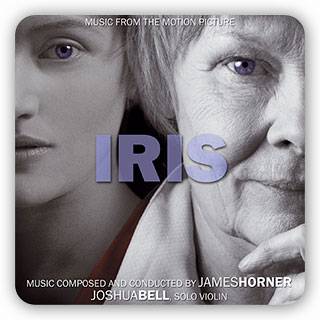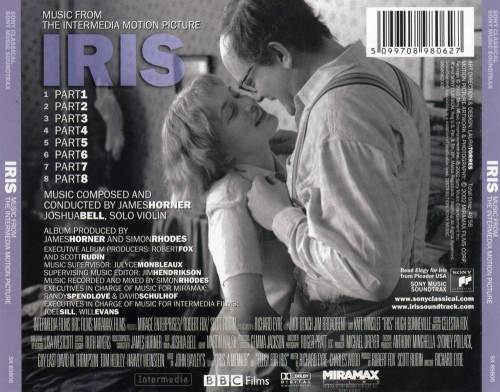CD Review - In Memory of James Horner (1953-2015)
It is with much sadness that the plane crash which ended the life of this major film composer is being mourned by many film music professionals and fans. Though many film fans will remember his better known scores for blockbuster films like BRAVEHEART, TITANIC, or AVATAR, I have chosen to offer a much subtler score with the reprint of a CD review and offer it as a memorial to James Horner. May his music continue to be shared by those who appreciate his gift for composing memorable film scores.
-- Roger Hall, Editor, Film Music Review, 23 June 2015

Editor's Choice - Best of the Month

IRIS (2002)
8 Tracks (49:58)
Music composed and conducted by James Horner. Joshua Bell, solo violin. Synthesizers: Ian Underwood, Randy Kerber. Orchestrations: James Horner, Randy Kerber, J.A.C. Redford. Music preparation: Vic Fraser. Album produced by James Horner and Simon Rhodes. Executive Album Producers: Robert Fox and Scott Rudin. Music Supervisor: Julyce Monbleaux. Supervising Music Editor: Jim Hendrikson. Music Recorded and Mixed by Simon Rhodes. Art Directtion & Design: Laura Torres.
Sony Classical/ Sony Music Soundtrax SK 89806
Rating: ****
This score is similar to Horner's A BEAUTIFUL MIND (ABM). IRIS is a tender score, with a minimum of Horner "borrowings." It's also different from other scores in that the arrangement of tracks are divided into 8 parts and not given separate titles.
As in ABM, Horner has chosen a classical artist to be soloist. In ABM it was Charlotte Church. For IRIS, he has chosen the highly accomplished violinist, Joshua Bell, as his soloist.
The film was written by Richard Eyre and Charles Wood is based on the memoirs of John Bayley, who was married to the writer, Iris Murdoch. Both of the central characters in the film are played by two actors. Iris Murdoch as an older woman is played by Judi Dench, and a younger one by Kate Winslet. John Bayley is played as an older man by Jim Broadbent, and by Hugh Bonneville as a younger man. The film was directed by Richard Eyre.
[SPOILERS AHEAD! Proceed only at your own risk of learning too much about this film story]
Part I (3:42) features the Main Titles and "an underwater sequence introducing Iris and John, both young and old, as they enjoy a swim." This is nicely set up with fluttering strings and Joshua Bell's prominent violin solo.
The next part (3:24) is concerned with Iris and John meeting for the first time and so is naturally quite soft and romantic in its treatment, especially with the use of French horns and strings, a combination which Horner has used before.
When Horner accompanies the heartbreaking knowledge of Iris's illness in Part III (4:46), it is quite poignant, with the reoccurence of the main theme from Part I, played by solo violin and other instruments in the orchestra.
The two longest tracks are Parts V (11:00) and VII (10:57). Part V starts off with solo violin playing in combination with other instruments such as clarinet and French horn. The scenes in this part move from romantic young love making to old age fighting. Horner keeps the same soft dynamic throughout these scenes, as if to indicate that this couple are meant to be together from youth and old age.
Then in Part VII, there are the scenes where Iris has a mental breakdown after her firend, Janet, dies. Later on, Iris herself dies with John at her bedside. These scenes are among the most touching of all and Horner does an excellent job of accompanying them. This music brings to mind the tender finale of COCOON, especially with those often used rolling chords.
The last track (4:47) opens with a simple folk song, "A Lark in the Clear Air," sung by Kate Winslet. Following that are the End Credits music. Joshua Bell's adds some birdlike fluttering on his violin and the rolling chords come back again in the orchestra and the piano play an important role as well. It ends with high notes played on the violin, perhaps symbolizing the final rest of Iris after her years of mental anguish and Alzheimer's disease.
The CD flyer has mostly film stills, but there are also descriptions for each part of Horner's score. Being that the music is mostly very soft, the sound mixing never seems to overwhelm like it could in other hands.
This soundtrack is far superior to those "ear bleeders" available on the market today. In other words, you don't need to put cotton in your ears when you listen to this score. There are no crashing drum beats or electronic sounds. Just comforting music presented in a soothing format.
IRIS is even better than Horner's other recent fine score for A BEAUTIFUL MIND.
I highly recommend IRIS as a score that will give you a sense of peace and tranquility. And what more can you ask for in these days of terrorism and violence?
--Roger Hall, 8 February 2002

Hear Part 1 of IRIS on YouTube--
Click here
A James Horner Tribute on YouTube--
Click here

